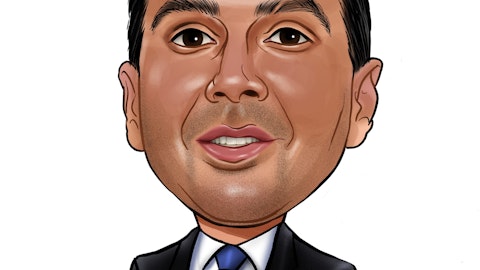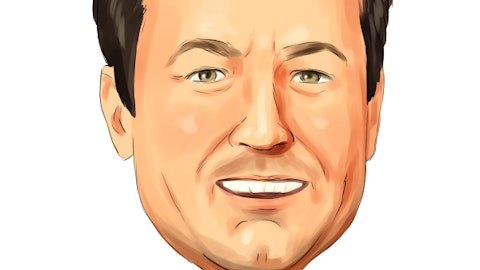Brooks Pierce: Yes, I think we feel obviously these growth rates are tremendous, and at some point it’s going to flatten out a little bit, but we certainly feel like we have a number of amazing opportunities in geographies around the world with a number of new products that are coming out. Some of the things that we’ve done, Dave, to increase the frequency, I mean we’ve taken the betting cycles down, and a number of markets going from three minutes to two minutes to even one minute. And we’ve seen a commensurate uplift in the revenue, which really kind of helps validate the product, and we think it certainly works in every market, but obviously the biggest market that we’ve been talking about for quite some time is North America, and we’ve made progress there.
I mentioned in my remarks about how Ontario has now gotten to be a significant market for us. And we’ve been having a number of conversations with both lottery operators and sports betting operators. And I think people are coming around to the idea that this is a product that’s viable. In terms of the sports betting operators, this is a great product for them to add to their mix. So, we feel like we’ve got a lot of runway across all of the Virtual Sports business.
David Bain: Okay, awesome. And then, thanks, Brooks, from a content kind of creation perspective, you have iLottery, Virtual Sports, Interactive, Land-based. Can you give us a sense as to how the team is aligned and if there’s going to be any sort of changes like dedicated lottery studios, maybe from a CapEx perspective, something to think about, or are they just really just feeding into one another? How do you kind of set this up as you broaden categories and strengthen categories going forward?
Brooks Pierce: Yes, I mean it’s a great question, and honestly, the content teams, if you had seen what we’ve done at ICE, really across the whole business, they really are kind of hitting on all cylinders, but at some point, we’re going to run into — particularly if we gain some momentum in the iLottery content space, where we’re probably going to have to add capacity in terms of content. We did actually hire someone on the iLottery side who used to work for us at tie games, and he’s created three games that you’ll see coming out this year that we’re pretty excited about. But it’s certainly not out of the realm of possibility that we would add additional studio capacity, whether that be build it ourselves or potentially acquire it. So, generating kind of world-class content is really what we’re all about, and we’re certainly going to make sure that we have enough capacity to produce it.
David Bain: Awesome. Thank you.
Brooks Pierce: Thanks, Dave.
Operator: Your next question comes from the line of Ryan Sigdahl from Craig Hallum Capital Group. Your line is open.
Ryan Sigdahl: Good morning. Congrats on the performance in 2022 and to Brooks, I want to start with gaming to Paddy Power, Betfred transitioning to the asset light model this year. Curious what that transition timeline looks like throughout the year. And then, secondly, do you have any other smaller customers that you haven’t talked about that are also transitioning? Curious, more so around the supply chain and installing 7,000 cabinets with those two, but is there enough capacity to do more beyond that?
Brooks Pierce: Yes, so I’ll talk a little bit about the operational side, but I think Stewart probably should talk a little bit about the financial side. Yes, look, we’ve done this before where we’ve replaced a number of cabinets and we do it in partnership with our customers because we’re going to install 7,000 terminals, but they’re over a huge number of locations. So, from an operational standpoint, it’s a lot of coordination literally from supply chain all the way through to working with our customers to get them installed in all the locations. So, that’s pretty much going to take most of kind of the second, third and maybe even bleed a little bit into the fourth quarter before we’ll have all of these terminals replaced.
I don’t know, Stewart, is there anything in terms of — Well, I guess Ryan is just going back a little bit in terms of the forward inventory that we’ve done to be able to be able to deliver all this stuff, we made a conscious decision to go out and deal with anything in relation to the supply chain and get on the front foot, I think, as Stewart said in his remarks, so it’s a big challenge, but we feel pretty confident about it.
Ryan Sigdahl: Talk about any other customers potentially beyond those two to transition?
Brooks Pierce: Not meaningful in terms of in the U.K. But I think I did mention that we have one jurisdiction that now is active on trial and we expect another one, both of these in North America. But this would be an order in one location of kind of 150 terminals and another one it could be up to 1,000 terminals. So, it shouldn’t stretch us in any way. But we’ve got to go through and have successful trials with them. But obviously if we’re successful there will be two more markets in North America where we’ll have a presence, which is what we ultimately want to do is build a big North American gaming business.
Ryan Sigdahl: Then just one on Interactive, so congrats on FanDuel integration, good to see that finally done; curious the timeline on the other two major iGaming operators, your leaders I guess in the U.S. market. DraftKings, beyond Pennsylvania, which I believe you’re live only in that state and then that MGM and then maybe beyond those. Any updates on Caesars and Penn and some of the others?
Brooks Pierce: Yes, so DraftKings were live within Connecticut and New Jersey as well. And interestingly, I don’t think, we don’t disclose down to the customer level, but our performance with DraftKings as of late has been very good. And MGM is our biggest customer in the iGaming space and they continue to produce their leader, I guess certainly nationwide they continue to produce amazing results with us and we have a great relationship with them. I can tell you that all of them are very excited about some of the content that we have coming out. I mentioned Terminator license, licensed brands really do resonate in the North American market, probably more so and around the rest of the world. So, we’re obviously with our background with Scientific Games, with licensed products, we’re very familiar with that space. So, I think you’ll see more and more of that going forward as a way for us to kind of differentiate ourselves.
Ryan Sigdahl: Great. Thanks, guys. Good luck.
Brooks Pierce: Thanks, Ryan.
Operator: Your next question comes from the line of Jordan Bender from JMP Securities. Your line is open.
Jordan Bender: Great, thanks for taking my questions, and congrats again, Brooks. I want to start on the Virtual side. So, the margins for Virtual continued to get stronger, they did throughout 2022. As we look forward in the ’23, are the margins you’re generating now something that we should think about are these sustainable at these levels? Thank you.
Brooks Pierce: From my perspective yes, from my perspective, there’s no reason that the margins would be any different than what we’re seeing. It’s obviously a great business in terms of the growth rates and the margins. And really there’s no capital for us per se, really. It’s just developing the content. So, unless Stewart feels or Lorne feel any differently, I don’t see any reason why margins will be any different than where they are.
Stewart Baker: No, I agree.
Brooks Pierce: Go ahead, Stewart.





